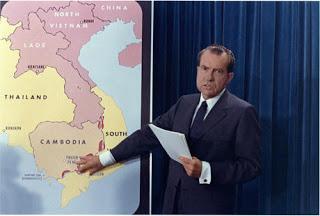 Richard Nixon took office with a bold strategy to end the Vietnam War. "I call it the Madman Theory, Bob," he explained to Bob Haldeman, his White House Chief of Staff. "I want the North Vietnamese to believe I've reached the point where I might do anything to stop the war." While running for president in 1968, he encouraged Anna Chenault to sabotage negotiations between North and South Vietnam just before Election Day. Now he hoped to achieve "peace with honor" by unleashing his madness on Indochina.
Richard Nixon took office with a bold strategy to end the Vietnam War. "I call it the Madman Theory, Bob," he explained to Bob Haldeman, his White House Chief of Staff. "I want the North Vietnamese to believe I've reached the point where I might do anything to stop the war." While running for president in 1968, he encouraged Anna Chenault to sabotage negotiations between North and South Vietnam just before Election Day. Now he hoped to achieve "peace with honor" by unleashing his madness on Indochina.To implement his plan, Nixon simultaneously waged war against America's foreign policy apparatus. He invested unprecedented power in Henry Kissinger, his National Security Advisor, while marginalizing the traditional bureaucracy. He viewed the State and Defense Department as natural enemies, staffed with career bureaucrats and Democrats he couldn't control, leaking military and diplomatic information to the press and undermining his plans. He trusted Kissinger, who'd support the President's irrational whims to consolidate power, more than his hapless cabinet.
"All you had to do was talk to Bill Rogers," speechwriter Pat Buchanan said of Nixon's Secretary of State, "and you knew who was going to come out on top." Though Nixon's personal friend, and former Attorney General to Eisenhower, Rogers had little foreign policy experienced. Reduced to a figurehead, he spent more time arguing with Kissinger (who spread unfounded rumors that Rogers was gay) than shaping policy. Nixon said that "Henry thinks Bill isn't very deep, and Bill thinks Henry is power crazy...They're both right."
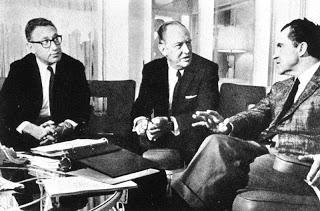
Uneven partners: Henry Kissinger, Bill Rogers and Nixon
Melvin Laird, Secretary of Defense, proved a tougher foe. A longtime Congressman from Wisconsin, Laird resented being "sandbagged" into his post after the President's first choice, Scoop Jackson, declined. Where Nixon pressed for escalation, Laird pushed a "Vietnamization" policy of turning the war over to ARVN. Nor was he averse to flexing his muscles. During the conflict between Jordan and the Palestinian Liberation Organization, Laird countermanded Nixon's order to bomb PLO targets in Syria. "The Secretary of Defense can always find a reason not do something," he said.Thus, Nixon and Kissinger worked to undercut their influence. With Rodgers sidelined, diplomatic information passed directly to Kissinger and his staff, including deputy Alexander Haig. Laird was undercut when Kissinger established a direct line to Admiral Thomas Moorer, the Chairman of the Joint Chiefs of Staff. Thus, Nixon and Kissinger could order military actions without notifying Rogers or Laird, let alone Congress, the press or the American people.
Career diplomats were caught in the crossfire, alternately baffled, resentful and powerless. "You're going to get screwed," Roger Morris, one of Kissinger's staff, warned diplomat Arthur A. Hartman. "You're going to lose all sorts of power." Morris urged Hartman to fight back, but State entertained no hope of open rebellion. "We can't get anyone to step forward," Hartman admitted, forcing Morris to conclude that resisting Kissinger amounted to a "lost cause."
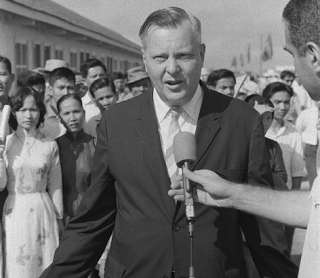
U. Alexis Johnson
U. Alexis Johnson, who'd served the Eisenhower, Kennedy and Johnson Administrations, confronted Kissinger over his coup d'état. "I told Henry I'd heard what was up and told him what was wrong with it," Johnson recalled. "I wanted it clear when it was the President who wanted something or when it was he." Kissinger responded, "It's already been decided and it's the way it's going to be." Finding Rogers nonresponsive, Johnson dropped his reservations and fell into line.Nixon had good reason to distrust his cabinet's willingness to acquiesce. In April 1969, Rogers and Laird restrained Nixon when North Korea downed an EC-121 reconnaissance plane. Nixon wanted to launch retaliatory strikes, with Kissinger warning that "it could go nuclear." Rogers and Laird, fearing another conflict in which China may become involved, vehemently opposed the action. Publicly challenged, Nixon backed down - and never fully trusted the secretaries again.
But Nixon had already stolen a march on the Secretaries, authorizing Operation Menu - a bombing of Vietcong supply lines in Cambodia and Laos - the previous month. Using his back channels, Nixon authorized the bombing raids in secret, informing Rogers and Laird only after the fact. "What do we care if the New York Times clobbers us now if it helps us end the war sooner?" Kissinger asked Nixon, mocking Rogers' warnings about the raids.
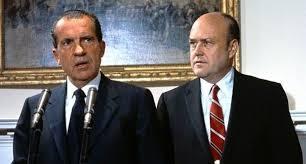
Nixon and Melvin Laird
When news of the Cambodian bombings leaked to the press, Kissinger exploded. "We must crush these people!" he raved to his aides. He asked the FBI to wiretap his staff and Rogers' State Department, seeking revenge on his rivals. He telephoned Laird, who was golfing at Burning Tree Club in Washington, yelling "You son of a bitch!" Laird instantly recognized the Teutonic growl and hung up, returning to his golf game.So Nixon pursued his "madman theory" unilaterally. From his time as Vice President, Nixon remembered Dwight Eisenhower's threat of nuclear weapons as a factor in concluding the Korean War. Now he'd implement the same strategy in Vietnam. "They'll believe any threat of force that Nixon makes because it's Nixon," he concluded, trading on his reputation as America's premiere red-baiter.
Thus was born Operation Duck Hook. Drafted by Admiral Moorer's staff, it envisioned bombing North Vietnam's Red River dikes, potentially flooding Vietnam's farmland, killing or starving millions. Other facets included unleashing nuclear weapons against Hanoi, mining Haiphong Harbor and bombing raids north to the Chinese border. Kissinger sent the president a memo urging that "to achieve its full effect on Hanoi's thinking, the action must be brutal."
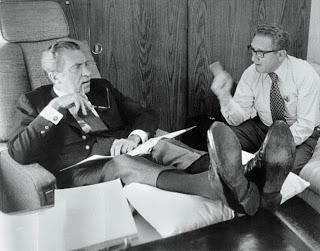
Only public opinion restrained Nixon. October 15th, 1969 saw a massive, nationwide antiwar demonstration, the Moratorium to End the War in Vietnam. Despite Nixon's claims that "Under no circumstances will I be affected by it," the backlash convinced him to scrub Duck Hook. He responded with his "Silent Majority" speech on November, alternately reasonable and bullying, assuring the public that "North Vietnam cannot defeat or humiliate the United States. Only Americans can do that."
Nixon enthused over the public response: millions of phone calls, letters and telegrams, with polls showing 77 percent approval of his speech. "We've got those liberal bastards on the run now!" he told Haldeman, encouraging his aides to organize a letter-writing campaign to harass critical newspapers and unleashing Vice President Spiro Agnew to blast the "nattering nabobs of negativism" in the press and media. He had routed the Eastern Establishment, liberal pundits and craven diplomats alike, and redoubled his hostility.
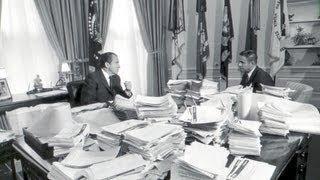
Nixon and Bob Haldeman, surrounded by telegrams
Operation Menu's main result, besides killing thousands of Cambodians and Laotians, was destabilizing Prince Sihanouk's neutral regime. In March 1970, a coup led by Lon Nol ousted the Prince, triggering increased North Vietnamese presence and strengthening Cambodian Communists, the Khmer Rouge. Nixon encouraged Kissinger to "develop and implement a plan for maximum assistance" to Lon Nol. He urged secrecy, telling Kissinger to bypass "those impossible fags" in State and work through the CIA.Smarting from the Senate's rejection of his Supreme Court nominee, G. Harrold Carswell, Nixon roused himself into a fighting mood. "I'll show them who's tough!" he raged to his staff, encouraged by generals who longed to strike Communist sanctuaries in Cambodia. He became obsessed with the movie Patton, watching the film repeatedly and adopting George C. Scott's swaggering mannerisms as his own. With Lon Nol's regime tottering, he prepared yet again to expand the war, this time with American ground troops.
With Laird and Rogers cut out of the planning, Kissinger convened a half-dozen skeptical aides on April 24th. When Anthony Lake argued against the operation, Kissinger interrupted him. "I knew what you were going to say." ("If I am predictable... then there is no point in my staying around," Lake recalled thinking.) He also mocked William Watts, his Executive Secretary, as a "bleeding heart" and dismissed Morris's prediction of "blood in the streets" from American protestors.
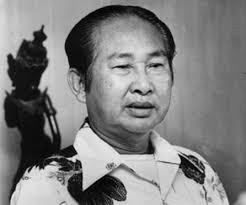
Lon Nol
Another aide, Laurence Lynn Jr., argued against the plan while wondering about Nixon's stability. "The plan was just awful," he said, branding the Joint Chief's strategy "imprecise and vague." Kissinger seemed interested, encouraging Lynn to write a list of criticisms. Kissinger promised to forward it to Admiral Moorer. But when Lynn asked Al Haig whether he should expect an answer, Haig declined to answer. Lynn, already on the hot seat for criticizing Duck Hook, was frozen out.Nor were higher-ups happy, once informed. Secretary Laird complained about Kissinger's military back channels and warning against high casualties during the operation. During a Pentagon briefing, Nixon startled the Secretary by demanding, "I want to take out all those sanctuaries" in Cambodia. One of Laird's aides tried to explain why that was impossible, leading Nixon to declaim "You have to electrify people with bold decisions... Let's go blow the hell out of them!"
Rogers, who feebly protested the invasion, found himself tasked with briefing Nixon's cabinet. The Secretary of State, sunburned and exhausted after a golf outing, exploded while reading a draft of Nixon's public announcement. "Unite the country!" he shouted, throwing the speech across the room. "This will make the students puke."
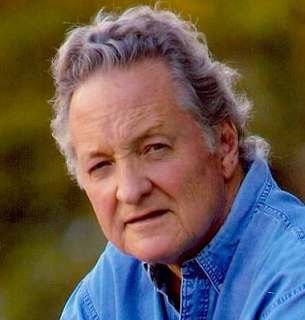
Roger Morris
Kissinger, himself skeptical of the operation's feasibility but unwilling to displease his boss, endured drunken phone calls from Nixon. Once, Nixon told Kissinger he planned, again, to nuke North Vietnam. Another time, Nixon phoned Kissinger in the middle of the night, bringing his friend, businessman Bebe Rebozo, on the line to taunt Kissinger. "If this doesn't work Henry," Rebozo muttered, "it's your ass." Kissinger groused, "Our peerless leader has flipped out."Finally, William Watts had enough. When Kissinger ordered Watts to coordinate NSC staff work on the invasion, Watts refused, telling Kissinger "I'm against this action on every count and I'm resigning." Kissinger, exhausted from weeks of planning while enduring staff dissent and Nixon's ravings, had no patience for his aide's pangs of conscience.
"Your cowardice represents the cowardice of the Eastern Establishment," Kissinger growled, infuriating Watts further. Watts recalled that "I just came up out of my chair swinging, I was so damn mad, and missed him," causing Kissinger to scurry behind his desk. Watts marched over to his office and wrote a resignation letter, with a furious Alexander Haig following after him.
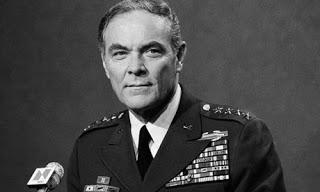
Alexander Haig
"You've just had an order and you can't refuse," Haig barked. Watts, his nerves worn thin by weeks of fruitless argument, rounded on him. "Fuck you, Al!" he shouted. "I just have and I've resigned." Watts handed Haig his letter then left the White House, driving straight home. When he formally resigned in July, Kissinger acted as if nothing had happened, assuring Watts that "It's been interesting."Roger Morris and Anthony Lake considered a public news conference to announce their resignations. Instead, they handed Kissinger a letter on April 29th, the day before the invasion. "We have grave reservations about the value of using U.S. troops in Cambodia," they wrote, adding that "the reasons for our resignations, involving an increasing alienation from this administration, also predate and go beyond the Cambodian problem." Two hundred State Department staffers sent Nixon a petition protesting the invasion; Nixon demanded that Rogers fire them.
On April 30th, Nixon announced the invasion in a televised address, gesturing towards a map that laid out his targets - not only Vietcong sanctuaries within Cambodia, but also, he promised, the headquarters of Communist forces in Indochina. He then threw down a gauntlet at antiwar forces, insisting the invasion was a "test of will" and that if "the United States of America acts like a pitiful, helpless giant, the forces of totalitarianism and anarchy will threaten free nations and free institutions throughout the world."
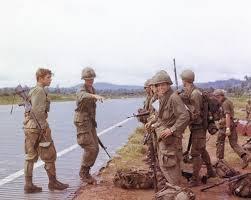
American troops preparing to invade Cambodia (source)
Whatever military successes the invasion accomplished, they were offset by massive protests at home and abroad, culminating in the Kent State shootings on May 4th, where Ohio National Guardsmen killed four students and wounded nine more. "When dissent turns to violence," Nixon chided, "it leads to tragedy," a callous response which triggered further protests. Nixon was shaken enough to visit the Lincoln Memorial and chat with protestors, engaging them in a rambling discussion of Vietnam, football and the importance of travel.Yet the system remained in place, with Rogers and Laird enduring their separate indignities until resigning at the end of Nixon's first term. Vietnam dragged on for another three years, incurring tens of thousands more casualties as Nixon sought "peace with honor." Nixon never used nuclear weapons (there were limited airstrikes against river dikes), but Hanoi suffered massive bombings as Kissinger scrambled for a doomed peace accord. Cambodia, Laos and South Vietnam all fell to Communism in 1975, rendering their deviousness moot.
Echoing the sentiments of many, Watts recalled that "Kissinger and Nixon had very exceptional brains. They were also, in my view, amoral in the very basic sense of the word. Right and wrong was not part of their calculus, it was win and lose." Their combined arrogance (and madness, in Nixon's own words) finally proved too much for sane bureaucrats and career diplomats to stomach.
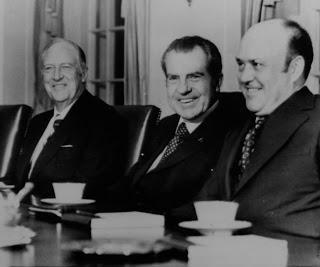
This article draws upon: Seymour Hersh, The Price of Power: Kissinger in the Nixon White House (1983); Richard Reeves, President Nixon: Alone in the White House (2001); and Tom Wells, The War Within: America's Battle over Vietnam (1994). An excellent interview with William Watts, conducted by the Association for Diplomatic Studies and Training, is online here.
Other articles on Richard Nixon and '60s politics:
- Eugene McCarthy Versus the Democratic Party, 1968
- George Wallace Stands Up For America, 1968
- Nelson Rockefeller and the Demise of the Liberal Republican
- Richard Nixon's Deplorables
- The Sad, Sorry World of Watergate Memoirs
- Spiro Agnew Grooves On
- William Scranton for President, 1964
- William Scranton for President, 1964: Part Two

